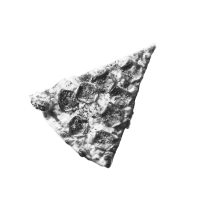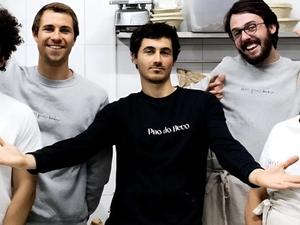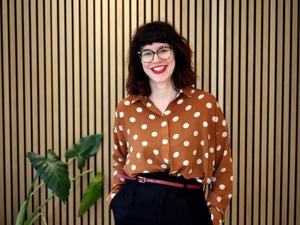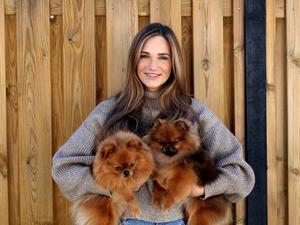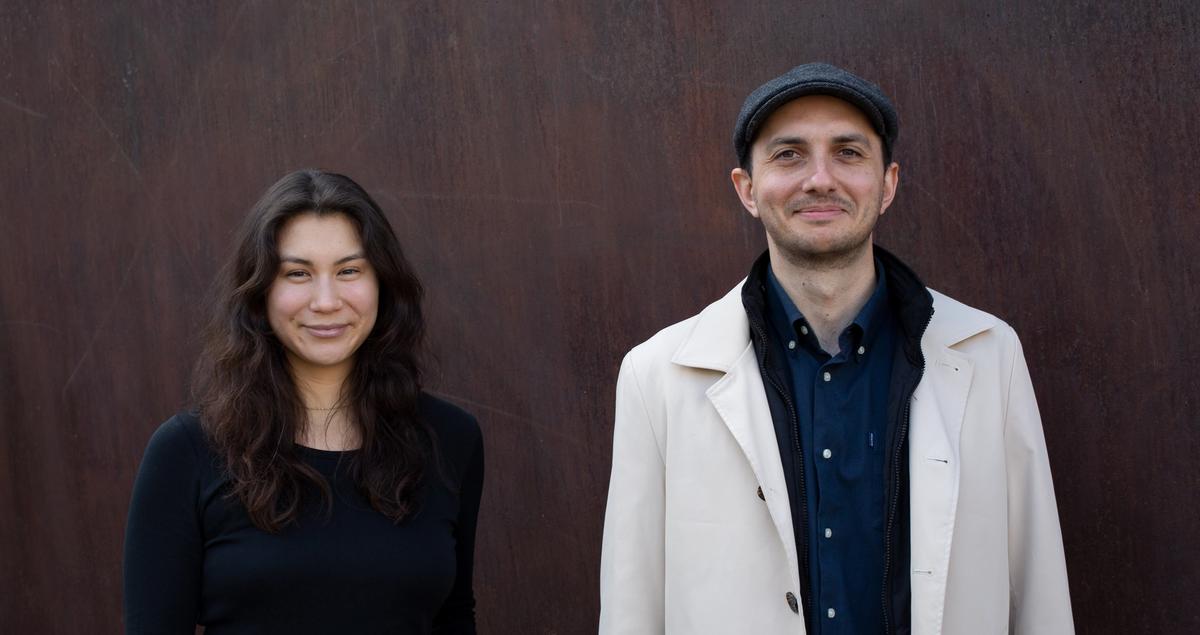
Meet the founders
of Alba Sourdough
Pizza
Satisfy your cravings with the combination of Italian know-how and a Swiss twist in Alba Sourdough Pizza. Run by Meagan and Simon in Switzerland, the duo aims to reinvent the traditional pizza business by incorporating their unique touch and experimentation background. After a successful run of their popup in Basel, Meagan and Simon are ready to take the next step and open their first restaurant in Zurich. We started collaborating with them in the early stages of their venture and ours, and we are thrilled by their evolution. It is time to grab a taste of their journey and delicious creations, about to make new waves in the Swiss food scene.
In this article...
- What is your business about?
- How did you come up with the pizza concept?
- How did you kick start your project?
- How did you find a space for your pop-up?
- What role did the community play?
- What did production look like?
- What kept you going?
- Did you have to invest your money?
- Did you do any marketing?
- How did Vev help you?
- What are your plans now?
- Do you still run the pop-up?
What is your business about?
Our background is in hospitality management. If I say we, it's my business partner Meagan and I. We studied in Switzerland, moved into digital, worked as product managers, and launched software products. But we were always interested in bringing the experimentation mindset back to operations for F&B businesses. That's how we then created our company, called Alba Sourdough Pizza.
The Pizza pop-up where Vev was helping out was our six or seven weeks pop-up that was open for five days a week. We launched it in a small café in Basel, Switzerland. I was creating the pizzas myself, and Meagan was managing all of the service front of the house. Vev was crucial for us. I had limited time at hand. I had one oven and could create a specific amount of pizzas, which meant we had to pre-sell our pizzas. We had to make sure that people could book time slots, stop by, grab their pizza and then go again. They didn't wait a second for it. We had this QR code where you could scan it, give us your feedback, or pre-order for the next time we were open. We were always sold out in advance, which helped us better understand the processes of creating pizza.
“Pizza made total sense because you have incredible margins. The most expensive pizza costs you only $1.20 ”
How did you come up with the pizza concept?
While we were traveling in Italy in 2020, we decided to really work on our business. We have been contemplating starting our own thing for a while, so we said, "If we are really serious about this, then let's start working on the business plan." In the beginning, we had a business plan for a full-service restaurant. We decided we needed this business plan to create a pitch deck. We could then pitch to potential investors and see if there's enough engagement and traction on our idea.
At the time, I was consulting restaurant owners to adapt to COVID. And what we saw was that you have to create something that is COVID-proof. So how can you rethink a restaurant where your offer is not happening only inside of your restaurant but where you can also tap into additional revenue streams? That would allow you to at least survive, keep up with the bare minimum costs to pay your rent, and maybe keep one or two employees.
People asked us, "How can you ensure that you are COVID-proof?" We thought about the products, which are still under the Italian umbrella, and how we could take this circumstance, such as COVID, and make it our strength. We analyzed businesses in the F&B sector that are flourishing and not being damaged by the pandemic.
Being Italian, I was in contact with many people that own pizzerias. Pizza made total sense because you have incredible margins. It costs you €1.20 for the most expensive pizza with the top ingredients. You typically also sell a lot of wine with it. Plus, both of us were really pizza passionate. We went to the Pizza World Cup and Naples a couple of times to understand the product, the best people in the game, and how we could start building our network. We knew that having pizza would allow us to sell our product online.
How did you kick start your project?
The idea that we wanted to validate was whether we could build a large enough community in a limited period of time that would also sustain this model. That is how it basically started. We didn’t want to spend money on a pizzaiolo that would create the pizza. So we had to learn it ourselves. I was watching YouTube videos on how to make Neapolitan-style pizza. In the beginning, it was an absolute nightmare. I was thinking, "What am I doing?" I got really into it and then started to experiment with it.
One of our company's values is constant experimentation on the problem that we want to solve. And the problem, in that case, was creating this pizza, which had a specific border. It was definitely a fun time. In the end, I think it was 84 experiments that I did on the dough. Different temperatures when putting flour and water into the mixer, different types of yeasts, proofing times, and first and second fermentation. And at some point, I had the pizza that I got down to, so I was proud of my product. Shortly after, we decided to go for it, thinking it could compete with the pizzas in Basel.
“We did 84 experiments on getting the best dough ”
In this article...
- What is your business about?
- How did you come up with the pizza concept?
- How did you kick start your project?
- How did you find a space for your pop-up?
- What role did the community play?
- What did production look like?
- What kept you going?
- Did you have to invest your money?
- Did you do any marketing?
- How did Vev help you?
- What are your plans now?
- Do you still run the pop-up?
In the end, I think it was 84 experiments that I did on the dough. And at some point, I had the pizza that I got down to. Shortly after, we decided to go for it, thinking it could compete with the pizzas in Basel.
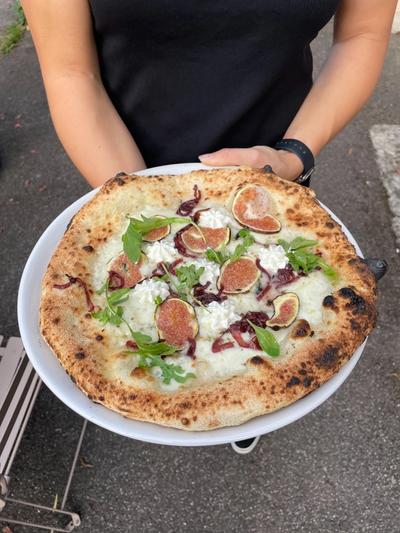
How did you find a space for your pop-up?
The restaurant and the café that we found was an experiment that we wanted to prove, that we wanted to be a little bit outside of the city. We didn't want to play the game inside of the city because it was already crowded with Vito Pizza, a chain that is basically grabbing all of the market in the city of Basel. Because we grew up in the outskirts of Basel, we decided that it would make sense to be at the border of the city. There are many people coming from the outside, like from the more land side, people work and coming back to the city, they don't want to go into the city to grab a pizza and then go back home. That was basically our assumption that we wanted to validate.
So we looked for cafés and restaurants that would be around that order, and we were looking for accessibility and exposure. And then we narrowed down our search on four or five locations where we thought this could be really interesting. We were looking specifically for cafés because we knew that they would be closed in the evening and we wanted to be available in the evening. We were not selling pies during the day. Also because I had to produce the pie for the next day during the day. That was all happening in my small apartment, which was interesting as well.
We reached out to those coffee places and said, "Hey, do you like to earn some additional money? We could give you a small rent" So we barely paid anything, maybe around 500 francs, but we would be able then to run our business. The permit was already inside, the kitchen and everything. So we just needed a little ventilation that would capture the air out. And I think for them also, it was nice because they were not scared that the inspection would come and they knew if it's time-limited, probably no one would come and it would be fine in the end. They wanted us to stay because they saw it as a good additional service for their community. People were talking about those pizzas. They were having coffee there, and then they would say, "Oh, that's so cool. Now, we can get pizza in the evening" We made it quite affordable also for Switzerland. We also knew it wouldn't make us tons of money, but we wanted it to be a sustainable business. In the end, we had a nice profit that we reinvested in our current projects.
“We always asked, "How did you find us?" ”
What role did the community play?
It was really a big community thing. In the end, 64% of the people were coming via the organic development of our concept. So we always asked, "How did you find us?" and the answer was by word of mouth, through referrals from the immediate community.
It's a big multiplier if you do a good job. For example, if you ask people and kindly say, "Hey, if you enjoyed the experience, it would be awesome if you could tell your friends about it." It works very well.
What did production look like?
Yeah, crazy! For instance, at an event we went to, we sold 300 pizzas in two evenings. We had two ovens for that. I was producing everything in my little kitchen of four square meters. So I had to think about so many layers because I had a limited production amount that I could create with my dough machine. I got a dough machine that could carry 6kg of dough. So that meant that I would prepare multiple doughs at the same time. I couldn't just go with one. I didn't have the big machine where I could do 300 pizzas in one go. It was just not possible.
So I had to split it up into smaller doughs. But every dough has a proof time, and every dough you create takes one hour to prove. You have to pre-prove, and then you have to put it into the fridge. So you can imagine that I had to do five or six pies for that respective day. So I had five different proofing times, so pre-proofing and then going into the fridge. So I stacked the dough according to the times I proved it. And then the next day, it was the same thing. First, you take the first tray and start to shape the balls, then the second, third, and so on. It was so complicated that I had this list of times of the different doughs and at what time they went into the fridge, and how I started that production.
It was an absolute nightmare. That was all happening during the day. And then in the evening, we would go and actually bake the pies and then sell it. And then we were sold out as well. We didn't have tomato sauce for the last 50 pizzas, so we sold Biancas.
What kept you going?
The fact that it was time bound and that I knew that we are learning right now and this is essential was helpful. Just being aware that we were doing this because we wanted to learn and see where we could take this. There was a reason also for us to come back. We knew we wanted to come back to hospitality. But take calculated risks and not be the typical story of a burnt-out restaurant owner that is managing all of the different tasks and is not able to create a system that helps them step back and see the business from a different perspective where you can also think about growing and where you're not tied into the operations too much.
But in the beginning, it's 80% doing and 20% thinking. And then with that 80% of doing, you can increase the percentage of thinking later on. You have to get your hands dirty before you're diving into something. So yeah, that kept me going, knowing that we would benefit tremendously from this for our understanding. But it puts you in a good position if you're talking to investors. And for us, it was super easy to raise money for an F&B business during COVID times. No one would believe you, but doing the work allows you to do that. At some point, you ask yourself, when you're in your kitchen in Basel, the dough is everywhere, and you don't remember a day when you don't squeeze flour from your fingernails. But at the end of the day, I knew it would be for the better. It's necessary to keep going and not lose sight of what is important.
Did you have to invest your money?
We were always working full time next to it. It was not that we were completely dependent on this. All the money we generated from it, we would put it into buying inventory. Then we evolved and said, how can we improve our return on investment by creating pies? And this is how this pop-up came about. It was in Conto 4056 owned by friends of ours, who we did this pop-up with for three nights. And during those three nights we were pre-selling packages including pizza, tiramisu, and a starter plate plus wine. Wine as much as you want for 100 francs. And that's a bargain in Switzerland, I can tell you that.
And then we also invited Campari. So we asked them, "Hey, would you like to do some free promotion?" And they brought us Campari, and we were selling Negronis as well. And we got to keep all the profits without spending money on inventory. We took all that, and we put it into our business.
Of course, we had a little bit of savings that we put into it. But it was never the large amounts, and we knew we needed to have skin in the game, which is important when talking with investors. Most of it came from investors, like beer contracts you can do with the industry. For example, you can approach Heineken and tell them, "Hey, we're going to sell your beer. How much are you willing to give us?" And then you have three or four and start to play them out against each other. The best offer wins. So that's how we got part of the funding.
Now we're preparing a crowdfunding campaign. Super easy also to engage your local community. You tell them "Hey, Free pizza for life for you and your bestie. And you give us 1400 francs." It works very well in Switzerland. Or even just having a negroni for life for you and your bestie. It also works like a charm. For us, the costs are super low, and then they come by to get a negroni, and maybe they'll also buy pizza. It's free marketing for us, barely any cost, and we get an upfront investment. So that's what we pretest on a small scale. And now we're preparing a bigger campaign to close the remaining 25% of the funding we need.
The restaurant and the cafe place that we found, it was an experiment that we wanted to prove, that we wanted to be a little bit outside of the city. We decided that it would make sense to be at the border of the city because there are many people coming from the outside, and they don't want to go into the city to grab a pizza and then go back home.
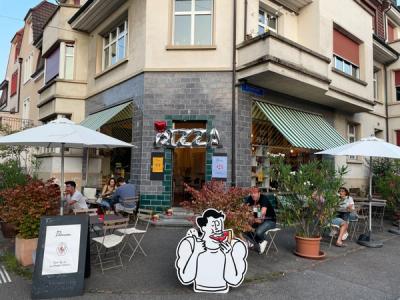
Did you do any marketing?
Building a big community and word of mouth helped a lot. We also got featured by GaultMillau at some point. Especially in Basel, people put a lot of attention on GaultMillau. So we managed to be featured in one of the articles, which gave us a nice push. We also used Instagram to inform people how the pizzas looked. It would create credibility for the product and give you a vibe of what you could expect. We always asked every customer that came: "Hey, how did you find us? Hey, could you give us feedback? Where did you come from?". We needed to ensure that the return on investment in our marketing efforts was high.
What worked very well was basic stuff like this experiment: we just had pizza balloons hung up because we knew we were at this intersection. We had posters and everything, but that was not enough in our understanding. Then all of a sudden, we had many walk-ins. So we had to figure out how to manage walk-ins.
Because of the traction, the café allowed us to open up all the tables outside. People could come by, sit down and have a wine or beer. And then we had this massive increase in revenue per head. We started to gain quite some money with it because people could sit down and have pizza there. But then there are also the benefits that they could drink alcohol, which is a high-margin item.
We were also experimenting with flyers which also worked quite well. People have this tendency not to trust them. And I'm one of those people, to be honest. But we thought about how we can make a super fun flier, which is not the average flier. We asked my former flatmate, a graphic designer, to create this funny flier, and the patch was the QR code. Attached to that, we had Vev. So that was also working out very well. People were coming in with the flyers. For us, it was eye-opening because we never assumed that what we like is representative of everyone else. We keep that open mindset that even with stuff that traditionally doesn't work for us, we still wanted to try it out, and it worked like a charm.
“Those pre-15 minutes, when you get announced the next event on your calendar, people use them to tie their shoes and walk to the place. ”
How did Vev help you?
For us, it was the time component that was super important. You could order a specific amount of pizzas for 15 minutes, and you would be limited to that. So just having those windows of time available for people to go on and order their stuff was amazing.
What people also liked is that we brought in our brand. So the whole experience was holistic. It was mentioned a lot in the feedback that we collected. People really liked how they already saw the product beforehand. So you have those pictures that you could upload, you had your brand colors in the background, your logo. All that really helped. What I remember was also working super well was that you can bring your menu online and make it available for people. You don't have to communicate on your cell phone.
On the consumer side, it was nice because you would have a timestamp in your calendar, so it was a reminder for them. "Oh, I can now go by, and I could grab my pizza." Especially for young people, that was super important. It was mentioned a lot of times that those pre-15 minutes, when you get announced the next event on your calendar, they use them to tie their shoes and walk to the place.
At the end of the day, I felt part of the Vev product development, and I loved it because that's what I was doing before. There was empathy on both ends. The team was super responsive, especially during heated moments, something you don't expect from regular teams. It was always working fast. We had massive respect for that because we couldn't manage it ourselves. It was a super nice process, and the people working on it.
What are your plans now?
After 1.5 years of search, we have finally found our permanent location in Zurich. After incorporating our business, we have found investors who believe in our vision. The pop up was especially important as we were able to show the proof of concept of our business.
It is expensive in Zurich. It's a sad thing, but I think it's necessary for gastronomy 2.0 when you see the traditional concepts that most likely fade out because they fail to adapt to new circumstances. What we're experiencing now is that more and more places are becoming available because people are tired and don't have enough energy to continue this business. And rising energy prices as well. So those are all reasons why more and more places are becoming available. We know that this availability on the market will also drop the price per square meter. So we're always looking and asking ourselves, "Is it worth it? Can we go here? Do we have everything in place?" And because Swiss people are super strict in certain things. Many elements need to click. And once we have the formula that works 80%, we will go in and start.
Do you still run the pop-up?
We do small-scale events for friends and investors where I'm still doing the pizza. But it's not how we used to run it before. Now it's more about raising awareness for our concept and raising some money to reinvest in our project. And once it's available, we will be fully engaged in operations again.
Create your own page, just like Alba Sourdough
Describe your business
Vev will create a custom page for you.
Get started
Click around to see how Vev works.
Customize your page
Add photos, descriptions and set your pricing.
